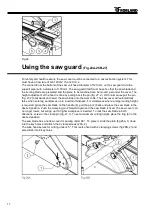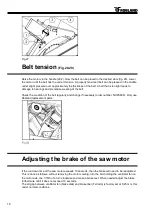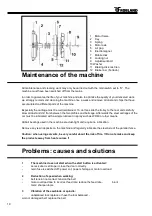
4
d) the safe handling of parts to be processed;
e) the position of the hands in relation to the sawblade;
f)
storing the workpieces safely before and after sawing them.
2 Stability
In order to be able to use the machine safely, it is essential to place it stably on the ground or other
stable surface.
3 Adjustment and installation
a) Disconnect the machine from the power supply before every adjustment.
b) The recommendations of the manufacturer must be followed when adjusting and installing the
tools.
c) The tools must be suited to the material being cut to assure safe and efficient sawing. The tools
must be correctly sharpened and installed.
4 Handling of tools
In order to avoid severe cuts, safety measures must be taken when handling the sawblades.
5 Intended use of the machine
The machine may only be used for processing all types of wood, panels and sheets with or without
plastic coating. The processing of plastic sheets and plastic is permitted with adapted saws. The
machining of ferrous and non-ferrous metals is strictly forbidden. In order to be able to maintain the
indicated sound values, all protective caps and means provided on the machine must be used. This
also applies to the dust emission and means that the machine must be connected to a dust
extraction system, whose air flow rate measured at the extraction opening on the machine is at least
20 m / sec. amounts.
Normal and prohibited use
The panel saw is designed for the following work and is equipped with protective devices for these
processes only. It is not designed to work materials such as ferrous or non-ferrous metals, work
different from that stated below is prohibited.
-
Ripping with the parallel saw fence with/without the sawblade tilted and the fence upright or in the
low position.
-
Right-angled or mitre cuts with the 90° fence mounted to the sliding table with tilted or vertical
sawblade.
-
Cross-cutting workpieces using the adjustable stop on the 90° fence. -
Cutting panels or
solid wood on the sliding table.
PROHIBITED USE
Following tasks are prohibited on the panel saw:
-
submerged cuts by removing the riving knife and/or guard;
-
all types of cuts without using the table saw fence, the 90° fence or sliding table; Cutting large
workpieces that exceed the machine capacity without using aids such as roller supports.
REMAINING RISKS
The most important risks on the panel saw are:
-
unintentional contact of the hand with the saw blade;
Summary of Contents for M500 EL
Page 6: ...6 General dimensions...



















